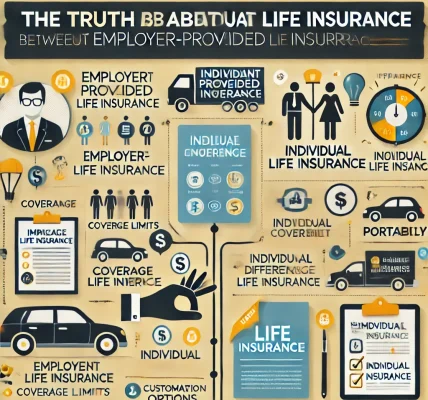Life insurance is an essential financial tool that provides security and peace of mind for you and your loved ones. When choosing a policy, one of the most significant decisions you’ll face is whether to opt for term life insurance or whole life insurance. Each type has unique features, benefits, and drawbacks, making it crucial to understand their differences before making a decision.
In this comprehensive guide, we will explore term life and whole life insurance, compare their benefits, and help you determine which option suits your financial goals and lifestyle.
What is Term Life Insurance?
Term life insurance is a type of policy that provides coverage for a specific period, typically 10, 20, or 30 years. If the policyholder passes away within the term, the insurer pays a death benefit to the beneficiaries. However, if the policyholder outlives the term, the coverage expires unless renewed or converted.
Key Features of Term Life Insurance:
- Affordable Premiums: Generally, term policies have lower premiums compared to whole life insurance.
- Fixed Term Coverage: Coverage lasts for a set number of years.
- No Cash Value: Term insurance does not accumulate any cash value or savings component.
- Renewability Options: Some policies allow renewal at the end of the term, but at higher rates.
- Convertible Options: Some term policies offer the option to convert to whole life insurance.
What is Whole Life Insurance?
Whole life insurance is a permanent policy that provides coverage for the policyholder’s entire lifetime, as long as premiums are paid. In addition to the death benefit, it also includes a cash value component that grows over time.
Key Features of Whole Life Insurance:
- Lifetime Coverage: As long as premiums are paid, coverage remains in force.
- Higher Premiums: Generally, whole life premiums are significantly higher than term life.
- Cash Value Component: Part of the premium is invested and accumulates cash value, which can be borrowed against or withdrawn.
- Guaranteed Payout: Beneficiaries receive a guaranteed death benefit.
- Dividend Potential: Some policies offer dividends, which can be reinvested or used to reduce premiums.
Comparing Term Life and Whole Life Insurance
1. Cost Comparison
- Term Life Insurance: More affordable with lower premiums.
- Whole Life Insurance: More expensive due to lifelong coverage and cash value benefits.
2. Coverage Duration
- Term Life Insurance: Covers a specific period; if outlived, no benefits are provided.
- Whole Life Insurance: Provides coverage for a lifetime.
3. Investment and Savings Component
- Term Life Insurance: No cash value; purely for risk protection.
- Whole Life Insurance: Builds cash value over time, which can be used as an investment or emergency fund.
4. Flexibility
- Term Life Insurance: Offers flexibility in choosing term length based on financial needs.
- Whole Life Insurance: Provides stability with fixed premiums and cash accumulation but lacks flexibility in coverage adjustments.
5. Purpose and Suitability
- Term Life Insurance: Ideal for individuals seeking affordable, temporary coverage to protect dependents, pay off debts, or cover a mortgage.
- Whole Life Insurance: Best suited for those looking for lifelong coverage, estate planning, or a financial asset with guaranteed benefits.
Pros and Cons of Term Life Insurance
Pros:
✔ Affordable premiums ✔ Simple and easy to understand ✔ Flexible term options ✔ Can be converted to whole life (in some policies)
Cons:
✖ No cash value or investment component ✖ Coverage expires if not renewed ✖ Premiums increase with renewal at older ages
Pros and Cons of Whole Life Insurance
Pros:
✔ Lifetime coverage ✔ Builds cash value over time ✔ Fixed premiums ✔ Can serve as an investment or savings tool
Cons:
✖ Higher premiums ✖ Less flexibility ✖ Cash value accumulation is slow in the early years
Who Should Choose Term Life Insurance?
Term life insurance is an excellent option for:
- Young professionals or newlyweds with financial responsibilities
- Parents with children who need financial security
- Homeowners with mortgages
- Business owners looking for affordable protection
- Individuals who need high coverage at a low cost
Who Should Choose Whole Life Insurance?
Whole life insurance is suitable for:
- Individuals seeking lifelong coverage
- People looking for an investment or savings component
- High-net-worth individuals involved in estate planning
- Those who want to leave a financial legacy for heirs
Which One is Right for You?
Choosing between term life and whole life insurance depends on your financial goals, budget, and coverage needs. Here are a few key questions to help you decide:
- What is your budget? If affordability is a priority, term life insurance is the better option.
- Do you need lifetime coverage? If so, whole life insurance is more suitable.
- Are you looking for an investment component? If yes, whole life insurance provides cash value accumulation.
- How long do you need coverage? If you only need coverage for a specific period, term life insurance is ideal.
Final Thoughts
Both term life and whole life insurance have unique benefits and serve different financial needs. If you are looking for cost-effective coverage for a specific period, term life insurance is the best choice. However, if you want lifelong protection with a savings component, whole life insurance is the way to go.
Before making a decision, evaluate your financial situation, long-term goals, and family needs. Consulting with a financial advisor or insurance professional can also help you make an informed choice.




